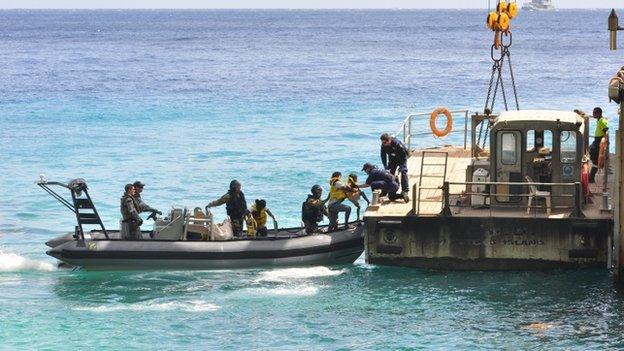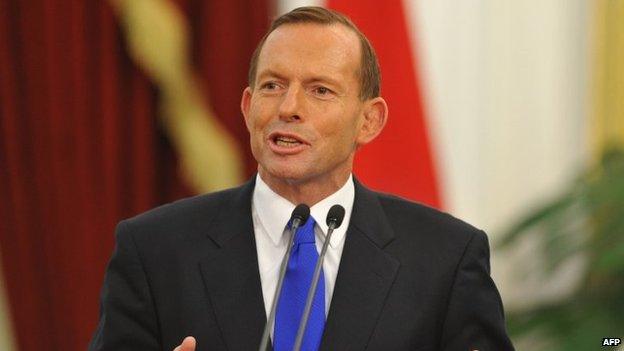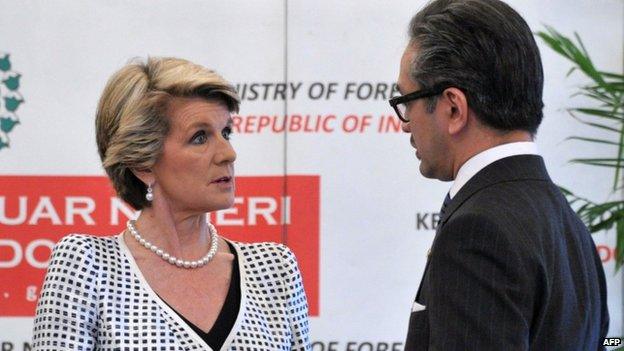Analysis: Will asylum policy cost Australia's Abbott dear?
- Published

Asylum seekers make their way to Australia via Indonesia, heading for Christmas Island
Within three months, Australia's conservative government will discover whether it has realised its mantra of "stopping the boats" - and have an idea of the cost of doing so in terms of relations with its nearest and vital neighbour, Indonesia, and its popularity with the electorate.
Right now, the balance remains tipped in the government's favour: no new asylum seeker boats have arrived on Australian soil since mid-December, a four-week respite and early evidence that the Tony Abbott government's tough, militaristic policy is working.
In the same period last year, 400 people arrived by boat. It is five years since there were no boat arrivals in this period.
Yet it is too soon for Tony Abbott, the leader of Australia's Liberal-National (LNP) coalition, or his Immigration Minister Scott Morrison to claim outright victory.
Boat arrivals traditionally slow over the Asian monsoonal season that makes the voyage between Indonesia and Australia even more perilous. The season ends in late March.
But if the boats actually stop then Abbott will have achieved what the previous Labor government could not: stopped the boats from getting in the way of other urgent policies and saved hundreds of asylum seekers' lives.
In a country where the concept of a fair go is deeply embedded in the national identity, people arriving by boat are seen by many as queue jumpers, coming here for better economic conditions, rather than escaping persecution.
Many, if not most Australians will be inclined to forget or at least forgive that stopping the boats came at a price of worsening relations with Indonesia and an unprecedented outbreak in government secrecy. That is the dictate of current political logic.
Secretive operation
Unauthorised arrival of asylum seekers is undoubtedly a raw nerve for voters and, with Labor's flip-flopping on the issue a matter of recent history, more of a vote-winner for the conservative side of politics.
Attitudinal tracking by the Lowy Institute, a respected think tank, shows three-quarters of voters are either very or somewhat concerned about asylum seeker arrivals. Lowy's work shows sentiment has been around this level for several years.
In 2001, then Prime Minister John Howard asserted that "we [the government] will decide who comes to this country and the circumstances in which they come". Almost 13 years on, the same rhetoric is in play.
Recent polling by AC Nielsen, one of Australia's leading pollsters, shows a deep divide opening between left and right on the government's handling of the issue.
More than 70% of LNP voters surveyed approved of the government's handling; a similar number of Labor voters disapproved - as did a whopping 87% of Green voters.
That poll was taken in mid-November 2013. As Australia returns from its summer slumbers, the pollsters will have plenty of new material to work with.

Tony Abbott says he is prepared to be a "closed book" on asylum to ensure policies work
Tony Abbott promised to run an open and "no surprises" government, and yet has positioned border protection, now known as Operation Sovereign Borders, as a secretive, military operation.
His government refuses to confirm or deny, for instance, whether it has been using lifeboats to send asylum seekers back to Indonesia when they are intercepted in un-seaworthy vessels, often made so by the Indonesian skippers.
Mr Morrison and Mr Abbott have invoked "operational matters" to stem the flow of information to the public, having successfully used Labor's facts and figures on asylum during its recent time in government to whip up public hysteria.
Mr Abbott says he is happy to be criticised for being secretive in the name of stopping the boats.
He is barely past his first 100 days in office and already the secrecy surrounding the policy's operation has opened up a flank for concerted attack from Labor, the Greens and sections of the media.
Distasteful as it may be, making border protection a military exercise could yet prove to be a positive move for Mr Abbott, given the high regard Australians have for uniformed personnel and the way "sovereign borders" dog-whistles back to John Howard's rhetoric.
But the government's confirmation last week that Australian naval vessels have breached Indonesian borders, on what is thought to be five separate occasions, shows the strategy comes with considerable reputational risk for the government, the military and relations with Indonesia.
Explanation sought
These are certainly difficult days between Canberra and Jakarta, made that much more pointed by pending elections in Indonesia and the preference for greater - not less - co-operation between the two countries from the Abbott administration on border protection.

FM Julie Bishop offered an "unqualified apology" to counterpart Marty Natalegawa over the incursions
First up, in November last year, came the revelations that Australia had spied on President Susilo Bambang Yudhoyono and his wife, Kristiani Herawati, albeit in 2009 on Labor's watch. Indonesia suspended co-operation on border issues with Australia as a result of the allegations.
Now, out of the blue, Canberra has publicly and unreservedly apologised to Jakarta for encroaching on its territory in the act of dealing with unauthorised boat arrivals. Agus Barnas, a spokesman for Indonesia's Minister for Politics, Law and Security, Djoko Suyanto, has warned that development will "only worsen the Indonesia-Australia relationship".
Unsurprisingly, Indonesia has not simply let the matter rest with Canberra's apology. It has requested an official explanation for what happened - and asked Australia to abandon its policy of turning back the boats.
There is little or no chance of that happening when the policy appears to be working well for the domestic Australian audience. Indonesia, in turn, has announced it will have its own navy frigate patrolling the area between Australia and Indonesia by the end of the month.
With some Indonesian politicians seeking to exploit the issue in forthcoming elections, the stage is set for the war of words to build.
Mr Abbott could very well stop the boats but in doing so cost Australia the chance to build a deeper and more financially rewarding relationship with Indonesia. These are not only the security and cross border issues that may help win elections, but economic links that prove to be of mutual and lasting benefit, such as from trade and tourism.
With such promise, it's no surprise that Mr Abbott and Foreign Minister Julie Bishop describe Australia's relationship with Indonesia as being of vital importance.
The question is, does the new government possess the skills and desire to handle the relationship with the necessary degree of deftness and diplomacy, or does stopping the boats take precedence over everything else?
Peter Fray is the editor-in-chief and founder of the political fact-checking site, PolitiFact Australia, an adjunct professor at Sydney University and the former editor-in-chief of the Sydney Morning Herald.
- Published17 January 2014
- Published9 January 2014
- Published4 September 2013